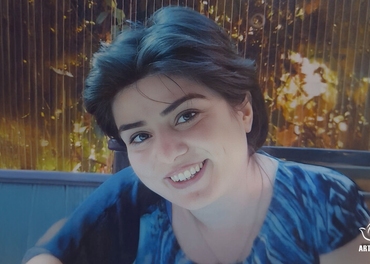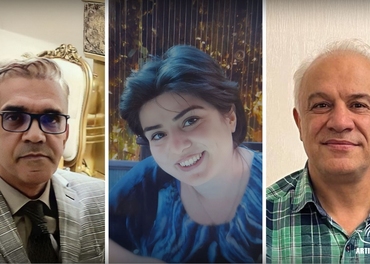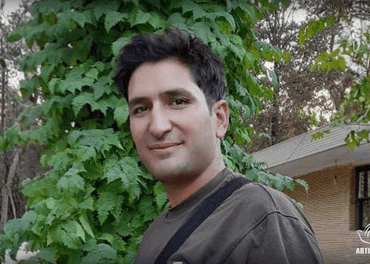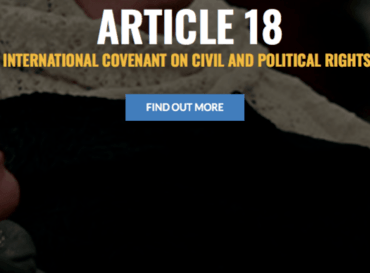Aida Najaflou og fire andre har fått dommer på langt over 50 år til sammen.
‘Iranske kristne må sikres steder å be uten frykt for politi og fengsel’
Det iranske regimet svare på spørsmålet om hvor persisktalende kristne kan samles fritt, krever Stefanusalliansen og ni andre.
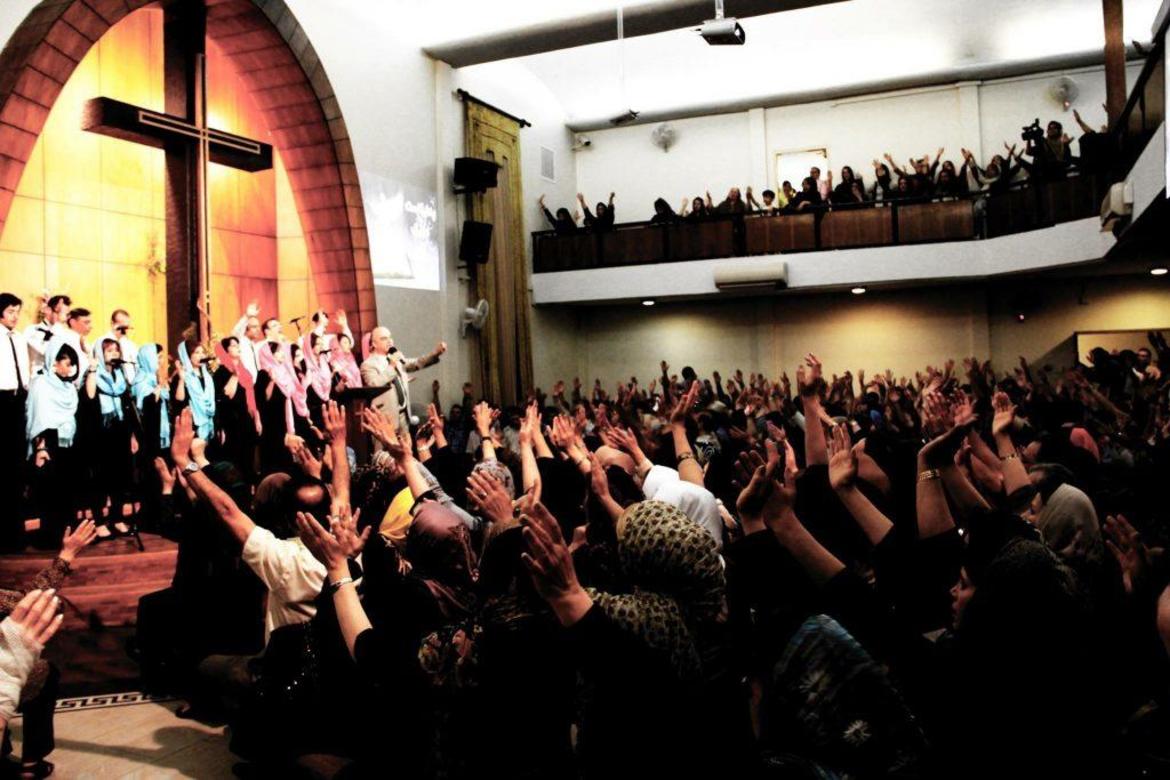
Den store Assemblies of God-kirken i Teheran før den ble stengt med makt i 2013.
Det er kravet fra ti kristne organisasjoner som skriver brev til FNs høykommisær for menneskerettigheter.
Stefanusalliansen har signert brevet sammen med trosfrihetsorganisasjonen Article18, som støtter iranske kristne, og åtte andre organisasjoner.
Brevet går til FNs høykommissær for menneskerettigheter som blir bedt om å søke svar fra det iranske regimet på spørsmålet om «hvor persisktalende kristne kan samles for å tilbe fritt uten å risikere trakassering og fengsel på overdrevne anklager».
Krever løslatelse
I brevet ber vi også høykommissær Michelle Bachelet om å be om «betingelsesløs løslatelse av kristne samvittighetsfanger som for tiden er fengslet eller i eksil for fredelig utøvelse av sin religiøse tro», og «en slutt på det pågående angrepene mot husmenighetene, deres ledere og deltakere».
Persisktalende iranske kristne – både konvertitter til kristendommen og assyriske og armenske kristne som ønsker å tilbe på nasjonalspråket – har ikke noe sted hvor de kan tilbe kollektivt, i strid med både Irans grunnlov og Internasjonal lov.
Bare fire små kirker igjen
– Flertallet av persisktalende kirker av alle kirkesamfunn er blitt tvangsstengt de siste årene, heter det i brevet
– Bare fire små gjenstår. De holdes under tett overvåking av myndighetene. Og disse kirkene har heller ikke lov til å ta imot besøkende eller ta opp nye medlemmer, heyer det videre.
Vil skremme
I mellomtiden tillater ikke iranske myndigheter kristne konvertitter å gå i kirkene i de armenske og assyriske samfunnene, og disse samfunnene har selv forbud mot å holde gudstjenester på persisk. Dette gjøres for ytterligere å avskrekke konvertitter fra å delta.
Huskirker – fare for Irans sikkerhet
– Dette betyr at det eneste alternativet som er tilgjengelig for persisktalende kristne, er å tilbe i private hjem, i det som har blitt allment kjent som «huskirker». Imidlertid ser det iranske regimet på medlemskap i en husmenighet som en «handling mot nasjonal sikkerhet», som kan straffes med inntil fem års fengsel.
I mellomtiden risikerer de som etablerer eller leder disse husmenighetene en straff på opptil 10 års fengsel. De anses som en fare for rikets sikkerhet.
Les hele brevet på engelsk her:
Ms Michelle Bachelet
United Nations High Commissioner for Human Rights
Office of the UN High Commissioner for Human Rights (OHCHR)
Palais des Nations
CH-1211 Geneva 10
Switzerland
9 November, 2021
Persian-speaking Iranian Christians have no place where they can worship collectively
Dear High Commissioner Bachelet,
We are a group of Christian organisations, united in our commitment to the promotion and protection of human rights and our desire to see human rights afforded to all, in Iran and internationally.
We write to solicit your urgent intervention on behalf of Persian-speaking Christians in Iran, whose enjoyment of the right to the freedoms of religion or belief (FoRB) and expression are being violated comprehensively, as they currently have no place where they can gather to worship. This group includes converts to Christianity from a Muslim background, as well as ethnic Armenian and Assyrian Christians who wish to worship in the national language (Persian), as many do not speak or understand any other language.
The majority of Persian-speaking churches of all denominations have been forcibly closed in recent years, and only four small ones remain, which are kept under tight surveillance by the authorities. These churches are also not allowed to accept visitors or take on any new members.
The Iranian authorities do not permit converts to attend the churches of the Armenian and Assyrian communities, whose rights are recognised under the country’s Constitution. Moreover, these communities are themselves prohibited from holding services in Persian to further dissuade converts from attending. This means the only option available to a Persian-speaking Christian is to worship in private homes, in what have become widely known as “house-churches”. However, the Iranian regime views membership of a house-church as an “action against national security”, punishable by up to five years in prison. The establishment or directing of these house-churches – also considered a “national security” offence – carries a penalty of up to ten years’ imprisonment.
Thus, gathering peacefully in community with others to manifest one’s religious belief, as articulated in international human rights conventions, has been labelled a “security”-related offence, and Christians are increasingly arrested merely for gathering together for prayer or Bible studies.
In 2020 alone, there were at least 115 known separate instances of the authorities targeting Christians for the peaceful exercise of their religious belief in which a total of 237 individuals were targeted, and combined prison sentences of 147 years (1,760 months) were handed down. So far in 2021, at least 53 Christians have been arrested, and many more await imminent court hearings. At present, at least 17 Christians targeted on account of the peaceful practice of their religious belief are serving sentences of between two to 10 years. Two more are in state-ordered internal exile, having already spent years in prison.
In November last year, senior UN figures including special rapporteur on freedom of religion or belief, Ahmed Shaheed, and special rapporteur on human rights in Iran, Javaid Rehman, wrote to Iran about the reported “persecution of members of the Christian minority in Iran, including converts from Islam, as well as the detention of dozens of Christians, most of whom have been convicted for exercising their right to freely observe and worship their religion”. That same month, the UN’s working group on arbitrary detention concluded that Iran was guilty of arbitrary detention in the case of Pastor Yousef Nadarkhani, a Christian convert serving a ten-year prison sentence – later reduced to six years – for leadership of a house-church.
Earlier this year changes were made to Articles 499 and 500 of Iran’s Islamic Penal Code – relating respectively to membership or organisation of “anti-security groups” and “propaganda against the state” – which provide even greater scope for the authorities to bring charges against members of unrecognised religious-minority groups, such as Persian-speaking Christians, on spurious and ambiguous grounds.
Persian-speaking Christians are now wondering where they can freely gather to worship. Their appeal for freedom of worship, expression, association and the right to peaceful assembly also addresses a wider issue shared with other religious communities who are similarly experiencing violations of FoRB and associated rights and freedoms. Consequently, improvements in the human-rights situation for Persian-speaking Christians would also benefit other minority religious and ethnic communities, such as Baha’is, followers of Erfan-e-Halgheh (Inter-Universalism), Jews, Mandaeans, the non-religious, Sufi Muslims such as Gonabadi Dervishes, Sunni Muslims, Yarsanis, and Zoroastrians.
Iran is a signatory without reservation to the International Covenant on Civil and Political Rights (ICCPR), which in Article 18 provides for the right to worship and the right to adopt a religion or belief of choice. Persian-speaking Christians are being denied enjoyment of their very basic rights under the ICCPR. Additionally, Iran’s own Constitution, per Article 13, considers “Zoroastrian, Jewish, and Christian Iranians,” regardless of their ethnicity, gender and language, as “recognised religious minorities, who, within the limits of the law, are free to perform their religious rites and ceremonies, and to act according to their own canon in matters of personal affairs and religious education.” Thus, Iran is in clear contravention of its obligations under both international law, as well as the protections within its own Constitution.
We would be grateful if you would kindly use your good offices to make representations to the Iranian authorities, requesting:
1. Clarification on where Persian-speaking Christians can gather to worship freely without risking harassment and imprisonment on excessive charges.
2. The unconditional release of Christian prisoners of conscience currently incarcerated or exiled for peacefully practising their religious belief.
3. An end to the ongoing crackdown on house-churches, their leaders and attendees, and to all raids, arrests, prosecutions, imprisonments, and other forms of mistreatment against them.
We thank you for your vital work in promoting and protecting human rights in countries around the world, and for your time and consideration of this correspondence.
With our best wishes,
Article18
CSW
Middle East Concern
Open Doors International
International Christian Concern
Release International
Church in Chains
Stefanus Alliance International
Prayer Pioneers
Steadfast Global
